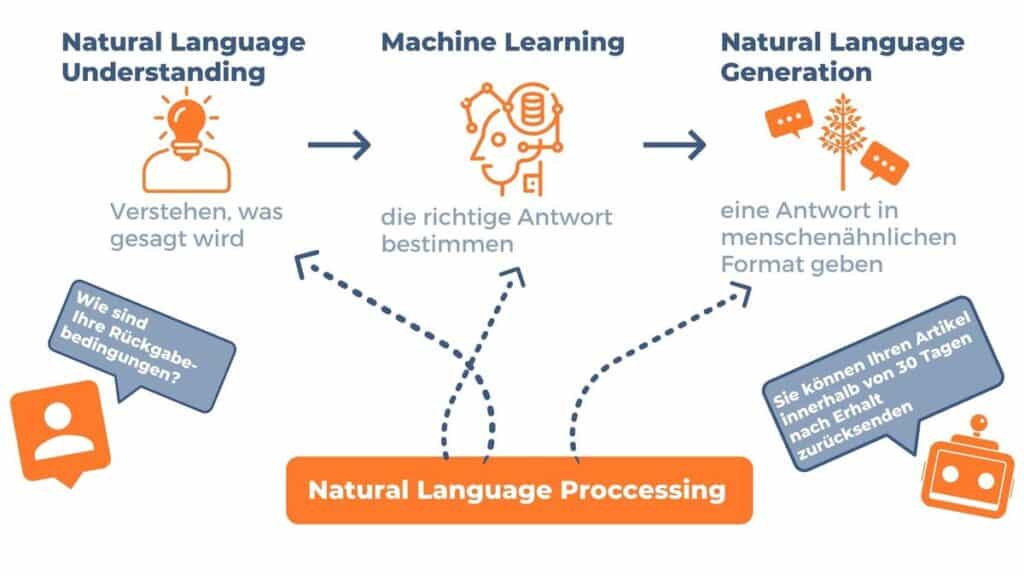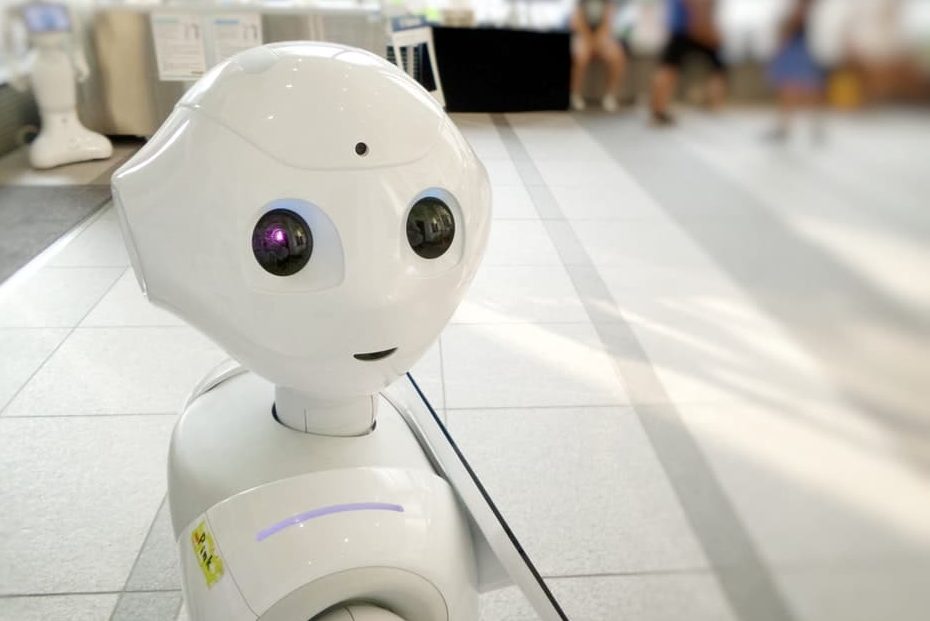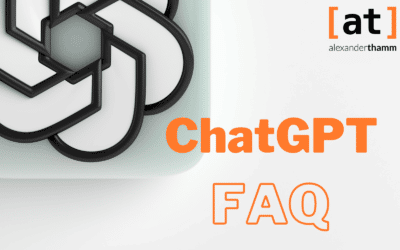The natural, spoken language of humans is the most direct and easiest way to communicate and exchange between people. If we want to communicate with machines, we need technical aids such as mice, trackpads, keyboards or similar. Natural Language Processing offers an alternative to this.
In addition to our natural language, we have developed programming languages and codes. Programming languages are also languages, but unlike natural language, they are not familiar and not intuitively understandable to most people. For this reason, very early in the history of the development of interfaces between humans and machines, natural language was the focus. An entire field of research and development developed from this: Natural Language Processing - or NLP for short.
Inhaltsverzeichnis
What is Natural Language Processing?
Natural Language Processing - or NLP for short - as a subject is located between classical linguistics and computer science. Expertise from both fields had to come together in order to make significant progress. On the one hand, it is necessary to understand the formal structure of natural languages and, on the other, to transfer this functionality to technical systems. For this reason, many universities now have an independent department for this purpose: the Computational Linguistics.
NLP thus builds on an understanding of language that divides language into several levels. The analysis of natural language always starts with the smallest, "meaning-distinguishing" unit. The comparison of these units gradually gives rise to a logical System, that describes a natural language. The two words "house" and "mouse" are linguistically distinguished by the phonemes "H" and "M". These two can thus take on a meaning-differentiating function.
Differentiations like this can be carried out at all possible levels of language until eventually ever greater connections emerge. Distinctive meaning Function have the following structural linguistic elements:
- Individual sounds letters as the smallest linguistic unit ("house" vs. "mouse")
- Segment analysis for the recognition of words ("I|go|home" vs. "I|go|to|home")
- Morphological analysis to recognise the endings ("ask" vs. "asked")
- Syntactic analysis of sentences and sentence structures ("He promised to buy me a new car every year." vs. "He promised to buy me a new car every year").
- Semantic analysis of the meaning ("golf = sport" vs. "golf = car")
- Dialogical analysis of communication (sender - message - intention - receiver)
Natural Language Processing now starts from a simple context. If it is possible to first build up an understanding of the smallest linguistic structures, gradually more and more complex relationships can be understood. So that machines or programmes can complex linguistic structures understand, they must first learn to understand the simple linguistic structures - similar to a child.

Natural Language Processing and Artificial Intelligence
When it comes to adaptive programmes, we are moving into the field of artificial intelligence. Accordingly, significant progress in the field of Natural Language Processing was only achieved when the use of artificial intelligence had reached a certain level of maturity. The main contributors to this were Artificial neural networks and Machine Learning Methods like Deep Learning with. This makes very complex issues, such as those found in the natural language of humans, comprehensible to machines.
We clarify all important concepts and terms around the topic of artificial intelligence in our blog article on KI.
Learning methods such as Transfer Learning interesting, as these make it possible not to always have to start from scratch. This means that once the basics of language are understood, certain solutions can build on them. However, Google made it clear at the latest with the presentation of the Google Assistant - "Google Duplex" - at I/O 2018 that Natural Language Processing is not exclusively about language understanding. Natural speech output is also part of the goal of human-machine communication.
Video: Natural Language Processing in practice: Google Duplex can not only understand natural language, but also use it itself.
The areas of application of NLP are versatile
The spectrum of possible areas of application is immense. It exceeds the human-machine communication mentioned first. Because on the way to a better and better Language comprehension Numerous areas of application opened up in which Natural Language Processing also provided new perspectives.
- Chatbots and digital assistants
- Intelligent word processing (auto-correction, speech-to-text conversion)
- Text mining for the intelligent evaluation of text data
- Translation programmes
- Generation of speech (voice output)
- Language as a medium of interaction for controlling machines
Furthermore, Natural Language Processing opens up numerous areas of application for users without special knowledge of programming languages, for example, or for people with disabilities, for example, by enabling production machines to be controlled via speech input. In this respect, NLP also plays a role in Transformation of the world of work a weighty role.
The time of NLP is just dawning
When you look at the immense progress that has been made in the development of digital assistants in recent years, it becomes clear that we are here just at the beginning of a development stand. The status quo is often characterised by frustrating moments. Many voice inputs cannot yet be sufficiently understood by assistants such as Siri or Alexa. The range of functions is currently limited to a specific set of applications that are well mastered. However, these isolated applications can increasingly be intelligently integrated into larger contexts.
In particular, developments such as Google Duplex show what will be possible in the future with the help of Natural Language Processing. For precisely this reason, it is crucial to particularly consider the use and the Development of Artificial Intelligence in Germany. Because machine processing of natural language is not only getting better and better. The enormous range of applications will only be properly developed in the future. That is why it is important not to lose touch in such a promising field as NLP.











0 Kommentare